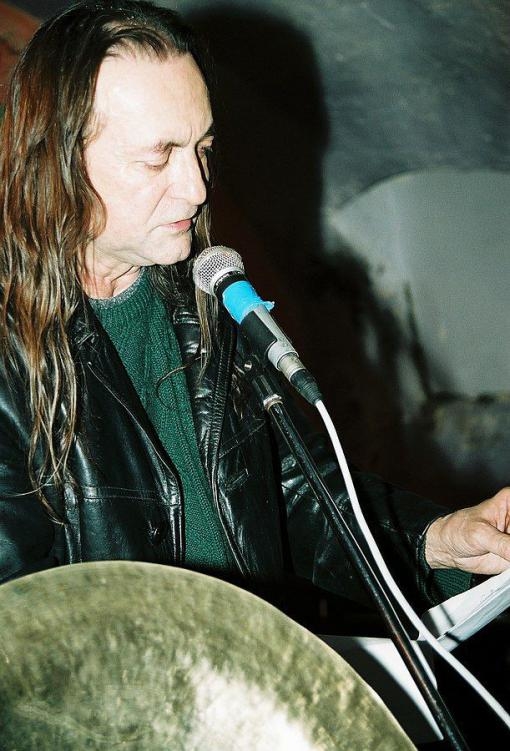A farewell was bidden to a great figure of Moravian culture took place in the Basilica of Old Brno on Thursday 30 May at 11 a.m. Not that culture that flows around us every day in magazines and the media, but culture called independent, alternative, underground, and in the person of the deceased, moreover interwoven with spiritual radicalism and Christian tradition. Jaroslav Erik Frič died aged 69 years on 24 May 2019 after a severe illness, but mentally active until his last days.
I have already dedicated Frič an obituary in Lidové noviny (27 May) and a more comprehensive article in Kulturní noviny (Journal of Culture), under the headline Hostinský neobyčejného ducha [Pubkeeper of Extraordinary Spirit]. It is an allusion to the fact that Frič – although he graduated in English and Philosophy – refused to serve in ideologically deformed institutions and having also undergone apprenticeship as a waiter, during the normalization period he made his living as a pubkeeper. In addition, he worked intensively on the spiritual path – spreading samizdat texts (especially written by his friends, poet Jiří Kuběna and philosopher Josef Šafařík).
His unconventional way of life, after the collapse of ideological barriers, gave him the basis for a cultural activity that eventually blossomed into an unprecedented breadth. Randomly quoting: He founded the Vetus Via publishing house, which with its dozens of titles published, along with a large part of the work of the poet Jakub Deml, is a dignified successor of the Moravian radical publishing tradition – Josef Florian's Dobré dílo [Good Work] in Stará Říše and the editorial work of Jakub Deml in Tasov. In general, Moravia, as a land with its own culture and history, was a lifelong take-off place for him and he suffered from its constitutional degradation. He organized hundreds of poetry evenings called Potulná akademie [The Wandering Academy]. He was the inspirator and driving engine of the Brno underground club scene. You may possibly ask why underground, given that Frič's education and his writing work were no doubt of a "high spirit"? Frič himself commented on this in an interview: "Marcel Duchamp once said that a true artist nowadays will descend into the underground. Because the underground, although I try to use the word as little as possible, is a life attitude and a belief. It is a useless, impractical, rough, immediate and always sharply personally guaranteed attitude." – This is the exact way J. E. Frič used to be: Any commercial thinking was essentially unfamiliar to him, and his own existence was just the same — it was bohemian and always “close to the edge”.
Frič was not a typical musician, even though he used to play as a "busker" on the street, and he was not a music composer either. He was above all a poet who had a strong relationship with music, and his poems and charismatic way of performing inspired some other musicians. Let's name Frič's close friend, cellist and composer Josef Klíč from Brno, and the group Čvachtavý lachtan. Their joint efforts resulted in titles that were released by the underground label Guerilla Records, led by another friend of Frič's, Vladimír Lábus Drápal: albums such as Jsi orkneyské víno [You Are Orkney Wine] (J.E.Frič and Čvachtavý lachtan, 2003), S kým skončila noc [With Whom the Night Ended] (J.E.Frič, Josef Klíč, 2006) and Na každý den napsal’s smrt [You Wrote Death on Every Day] (J.E.Frič, Josef Klíč and friends, 2010).
Thinking about how to conceive this text, I browsed through one of Frič's extraordinary achievements - an issue of the magazine Box/ slovo-obraz-zvuk-pohyb-život [Box/ Word-Image-Sound-Movement-Life] (1/2004). In this beautifully designed brochure with an extremely interesting content and small square format, there is everything that characterizes Frič: high publishing and editorial culture, an overview of his literary horizon and a number of friends (J. Kuběna, J. Balabán, I. M. Jirous, T. Vodička, O. A. Tichý, L. Bloy, G. Bernanos and others), an example of his active approach to political and social reflection – an opinion poll with a wide range of respondents called "What are or can be the fundamental unifying features of the so-called united Europe?", as well as photographs of works by visual artist Jan Koblasa and finally, as an attachment, a solo CD by Josef Klíč titled V půli kopce [Halfway up the Hill].
































No comment added yet..